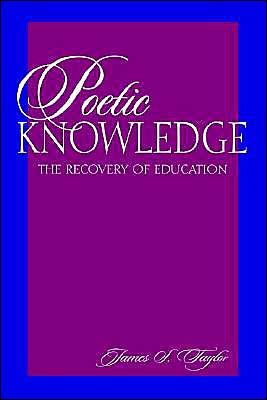

 |

|

The average rating for Poetic Knowledge: The Recovery of Education based on 2 reviews is 5 stars.
Review # 1 was written on 2014-05-06 00:00:00 Tim Lukes Tim LukesLet me describe first what this book is about. The title can be distracting if we aren't used to certain philosophical terms. This is not a book about poetry, although it is. It is not about knowledge, although it is. Poetic knowledge describes a certain kind of knowledge distinct from scientific knowledge. Scientific knowledge is what we are most familiar with: an analytical study of a subject, a rational knowledge about a subject. It is knowing a horse because you've memorized information and facts about it. Poetic knowledge is much different. It is the knowledge you have of a thing vicariously, sympathetically, through experience, relation, and love. It is knowing a horse because you've lived among them, having experienced horses and their lives and can love and sympathize with them. Poetic knowledge is a passive learning, that you receive through the senses and understand with the emotions, memory, and imagination. But these emotions (namely, wonder) "is no sugary sentimentality, but, rather, a mighty passion, a species of fear, an awful confrontation of the mystery of things," as Taylor quotes on page 159. Fear, of course, and especially the fear of God is the beginning of wisdom. In this book, James Taylor takes us through the history of poetic knowledge from the Greeks with Homer through Socrates, Plato, Aristotle, and on to Christian thinkers with Augustine, Aquinas, Maritain. He walks through a validation of poetic knowledge as a means of knowing and educating, to its historical roots, to a deeper understanding of what it is. Then, he changes gears and walks us through the legacy of Descartes and the destructive forces he and Dewey brought upon poetic learning in education. After a discussion of its demise, he reintroduces the reader to men who have practiced and implemented poetic learning in schools after Descartes and Dewey. Specifically, he takes us to a short-lived school in France in the 20th Century and another short-lived program at the University of Kansas, also in the 20th Century. He concludes with ideas on how to recover poetic education today and some images and descriptions of what it might look like in a school today. I must admit this book has had a huge impact on me. I am thoroughly persuaded by Taylor's presentation and arguments. I also find that I am wanting to read more along these lines. This book is the cause of my reading Josef Pieper's Leisure: The Basis of Culture, and is now the reason I am turning to Dicken's Hard Times. It is also the reason I will be buying poetry collections of Wordsworth. If you are involved in education in any way, this book is a must read. |
Review # 2 was written on 2018-08-09 00:00:00 Ryan Hoffmann Ryan Hoffmann"...there can be no real advancement in knowledge unless it first begin in leisure and wonder, where the controlling motive throughout remains to be delight and love." Not good grades or colleges, or prestige, or a well-paying job, but love. So many connections to Charlotte Mason, especially her three tools of atmosphere, discipline, and life; and also to other books I've read like Pieper's Leisure the Basis of Culture (which he quotes) and Lewis' The Four Loves (Taylor discusses teaching and friendship). Now I'm thinking through how we are seeking poetic knowledge already in our homeschool, and how we can do that better. |
CAN'T FIND WHAT YOU'RE LOOKING FOR? CLICK HERE!!!